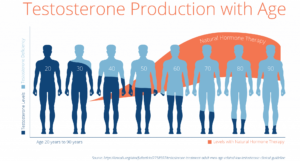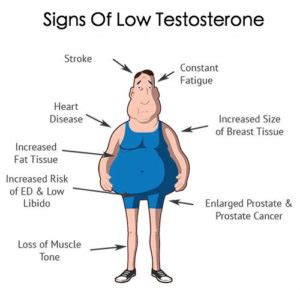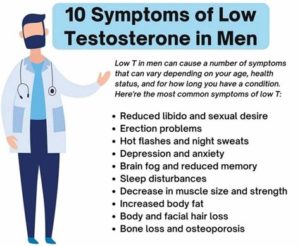In this post, we will discuss what are the 5 various reasons that can help you diagnose the possibility that your testosterone is low and declining. Testosterone is a crucial hormone that plays numerous essential roles in a man’s body, from maintaining muscle mass and bone density to influencing mood and libido. When testosterone levels drop below normal, a condition known as low testosterone or hypogonadism, it can lead to a wide range of symptoms and health issues. If you suspect you may have low testosterone, consider asking yourself these five questions to help determine if your testosterone is indeed low.
1. Are you experiencing a decrease in energy levels?
One of the hallmark symptoms of low testosterone is fatigue or a significant decrease in energy levels. If you find yourself feeling constantly tired, lacking motivation, and struggling to complete everyday tasks, it might be a sign that your testosterone levels are low. This energy decline can also be accompanied by feelings of weakness and decreased stamina, making physical activities more difficult than before.
2. Have you noticed a decrease in your sex drive?
Testosterone directly influences a man’s sexual desire. If you have recently experienced a considerable decrease in your libido or a decline in sexual thoughts and fantasies, it could indicate low testosterone levels. Additionally, low testosterone can also lead to difficulties achieving and maintaining erections, which can further impact your sexual performance and satisfaction. If you have noticed these changes in your sexual health, it is worth considering whether your testosterone levels are playing a role.
3. Are you experiencing unexplained mood changes or depression?
Testosterone plays a crucial role in regulating mood and overall well-being. Therefore, a decline in testosterone levels can lead to mood swings, increased irritability, and even depression. If you have noticed changes in your emotional state, such as increased sadness, anxiety, or even feelings of hopelessness, it may be worthwhile to explore whether low testosterone is a contributing factor.
4. Have you noticed a decrease in muscle mass or strength?
Testosterone is vital for building and maintaining muscle mass and strength. If you have been regularly working out and following a proper diet but have still noticed a decline in your muscle mass or strength, it could be a sign of low testosterone. This decline in muscle mass can lead to increased body fat percentages, especially around the midsection, further affecting your physical appearance and self-confidence.
5. Are you experiencing increased fatigue and difficulty concentrating?
Testosterone also plays a role in cognitive function, including memory, concentration, and cognitive processing speed. If you find yourself frequently experiencing brain fog, difficulty concentrating, or trouble remembering things that were once easy for you, it may be worth considering if low testosterone could be a contributing factor. Moreover, low testosterone has also been linked to an increased risk of developing Alzheimer’s disease and other forms of dementia, further highlighting the importance of monitoring testosterone levels.

In conclusion, if you suspect that your testosterone levels are low, evaluating your symptoms and answering these five questions can help you determine if low testosterone could be a contributing factor. However, it is essential to note that symptoms alone cannot provide a definitive diagnosis; consulting with a healthcare professional and obtaining a blood test is crucial for an accurate assessment. If you do have low testosterone, there are various treatment options available, including testosterone replacement therapy, to help restore your hormone levels and improve your overall well-being. Remember, addressing and managing low testosterone can positively impact not only your physical health but also your mental and emotional well-being.
WANT TO LEARN MORE SIGN UP FOR OUR UPDATES BELOW.
**Disclosure Statement:** Make Money With Max Online promotes affiliate marketing products or services to help save time when searching for courses or products that actually work. This means that when you click on an affiliate link provided on our website and make a purchase, we may cost you. We only recommend products or services that we personally believe in and have used ourselves. The commissions we earn through affiliate marketing help support the maintenance and growth of our website, allowing us to continue providing valuable content to our readers. Please note that our information and recommendations are solely based on our own experiences and research. Your own experience with any products or services recommended on our website may vary. Thank you for supporting Make Money With Max Online by using our affiliate links. Your support helps us continue our mission of helpful and honest information to our readers.




